KUALA LUMPUR, July 13 — Hours before his 10.30am opening hour, Mathana Shaib Seelthaan was already hard at work cooking about 40 dishes at his Nasi Kandar Basikal restaurant in Taman Lestari Perdana, Seri Kembangan.
The 49-year-old wore a serious look as he looked to feed and manage the crowds that throng his restaurant from before it opens until closing at 6.30pm. Some items run out around 3pm, despite several rounds of replenishing.
The pandemic has been hard on Mathana, his wife Katheesah Mohamed Gani and their restaurant, and they had hoped the lifting of Covid-19 restrictions would also buoy their business.

Like many other businesses reliant on migrant workers, however, their restaurant has been hit by a labour crunch as their foreign staff had to leave Malaysia after their work permits expired but have not been allowed to return pending government approval.
This has left the restaurant, which once had up to 18 workers, with just four at the moment, two of whom were the couple themselves.
To try and remedy the situation, Mathana said he has turned to the unusual route of hiring Malaysians instead.
“I interviewed those who came. I offered RM2,000 basic pay monthly, without overtime payment, EPF and Socso payments too, one day off per week and office working hour arrangement from 9am till 5pm. No one took it. Not a single person,” he said, referring to the mandatory Employees Provident Fund and Social Security Organisation contributions.
“The locals who enquired about the jobs were educated and were ashamed to pick up plates and cups. When I asked, that is what they told me. That they felt ashamed,” he claimed.
“I had to close down my kitchen department which serves cendol, rojak, soup varieties, roti canai, Western food and various fried items. The loss (of income) from that alone runs to about RM5,000 per day. Additionally, I am losing RM1,000 a month from food delivery platforms as I was forced to pull back owing to a lack of staff to deal with the influx of orders,” he says.
Mathana then said the only time his restaurant was profitable was when it could run until midnight daily.

Nasi Kandar Basikal’s history traces back to a small restaurant in Teluk Intan established in 1998 by Mathana’s late father, which he took over and built up to the popularity that has it receiving orders from as far as Port Dickson in Negri Sembilan and sometimes Johor.
“It was quite a struggle and today, we still struggle owing to lack of workers,” he said.
“I have applied for 20 workers but we have yet to get approvals from the Home Ministry,” he said, adding that he had identified the workers he needed from India, but most have left for Dubai as they received job offers and could not wait any longer the Malaysian government’s approval.
Like many desperate business owners in the service industry, Mathana and Katheesa then sought out local workers, expressing a willingness to pay up to RM100 per day for roti canai makers.
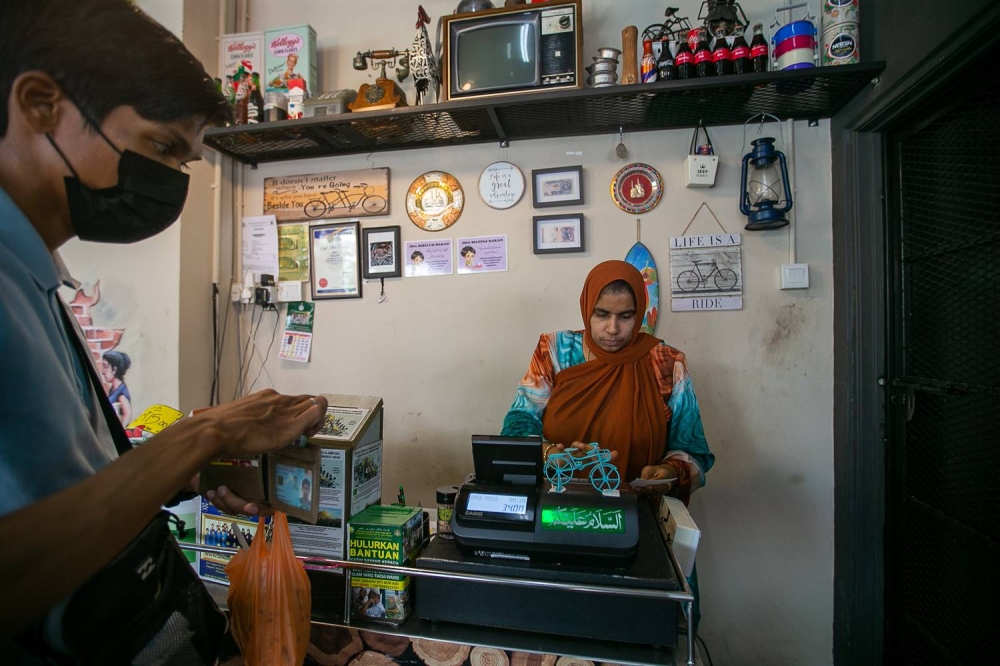
Mathana claimed that during one phone interview, he agreed to the RM2,700 salary that a local worker from another mamak restaurant requested.
“I said come. I will pay you what you ask for. I did not even negotiate. I agreed right away. The job was to help me scoop and mix the gravies and food items which the customers wanted. He did not turn up. He said he is from Setapak so I offered him free accommodation but still no word from him,” he added.
“When I asked some who didn’t turn up to work despite having succeeded in the interviews with me, these are what they ask me: Do I have to clear the plates? If I have to do that, then I do not want it. Do I have to wash the dishes? Then I don’t want the job.
“I tell them that I do those jobs too, despite being the boss. I clear and wash. But they shy away,” he said, adding that many students who had just completed their Sijil Pelajaran Malaysia (SPM) examination had also come for interviews, only to leave upon being told the job scope.
“It’s difficult when it comes to our Malaysians. Just recently, one worker bolted after working for a day. When I called to check, he told me he is ashamed to deal with customers. What more can I say? But they don’t seem to have a problem doing the same work at fast food outlets. Perhaps it’s more dignified to be seen there than here,” he lamented.

Mathana said he also advertised vacancy for cashier position but that also had no takers.
One of Mathana’s long-time workers also recently returned to India for his sister’s wedding and will only be back in three months, dropping the number of workers down to three.
Mathana said he was worried about the future of his business and fears the thought of having to close it down.
He has already been hospitalised several times due to high blood pressure. Just a day before his interview with Malay Mail, Katheesah was rushed to hospital and given intravenous (IV) therapy from the exhaustion of running the business and raising their four children, one of whom is in university.
The couple also said that they have not raised their prices despite having to grapple with increased cost and inflation.
“I have to take care of the feelings of my customers too. I don’t even charge for water, whereas in some places, a 30 sen charge is imposed. Many from all economic rungs want to enjoy our food here, so I have to bear their interests in mind,” he added.
Mathana hopes the government can address the foreign worker supply crunch soonest as it has been taking a toll on many businesses.
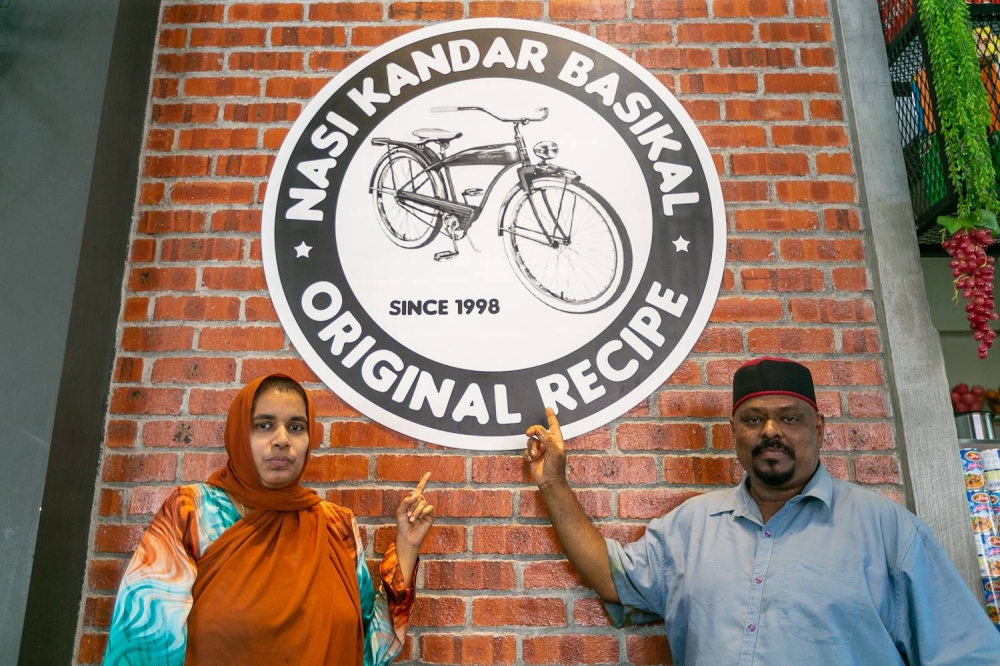
“The government must help us. Expedite the hiring process. We are honestly struggling a lot. I pay all my taxes on time. I am losing so much monthly, but I pay my dues on time. Please help us. This cannot go on for long. Everywhere I go, it is the same problem. On my end, I have tried and still am trying to recruit locals,” he added.
In April, the National Recovery Council (NRC) recommended that the approval process for foreign recruitment be expedited and simplified to meet the manpower needs of local industries.
National news agency Bernama reported NRC chairman Tan Sri Muhyiddin Yassin saying that the council was informed that from 4,561 foreign worker quota applications received, only 163 were being processed and were still to be approved at that time.
Flanders Trade and Investment said in its Food and Beverage Industry Report (Malaysia 2020) that the Malaysian food and beverages industry was fast growing and one of the main contributors to the nation’s coffers, with revenues of around RM102.43 billion in 2018, growing annually at a rate of 7.6 per cent.
The report added that Malaysia’s F&B industry is dominated by small and medium enterprises (SMEs).
The worker supply issue has also affected many other sectors both large and small, from palm oil plantations to semiconductor makers refusing orders and forgoing billions in sales, after being hampered by a shortage of more than a million workers that threatens the country’s economic recovery, Reuters reported.
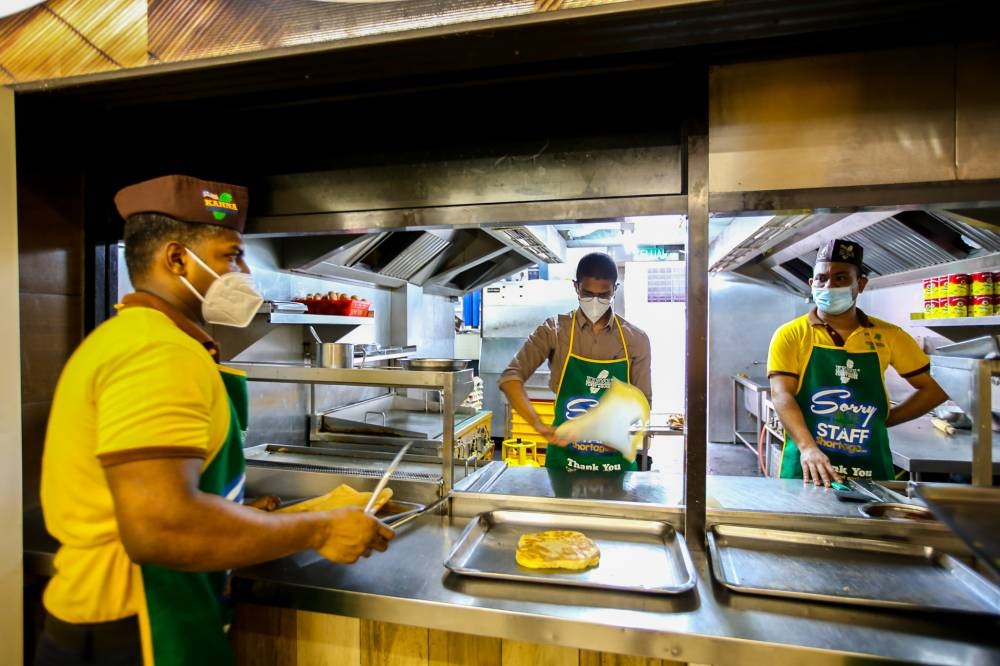
Going the extra mile to appeal to a local workforce
Kanna Curry House, that has several branches in the Klang Valley, was also one of those that found itself struggling for workers.
So, third-generation proprietor, K. Yoga Kannan, 28, and his management team devised plans to lure locals to join as waiters.
The chain offered free iPhone SEs to Malaysians who work as waiters at any of its branches for a minimum of six months as well RM10 hourly wages.
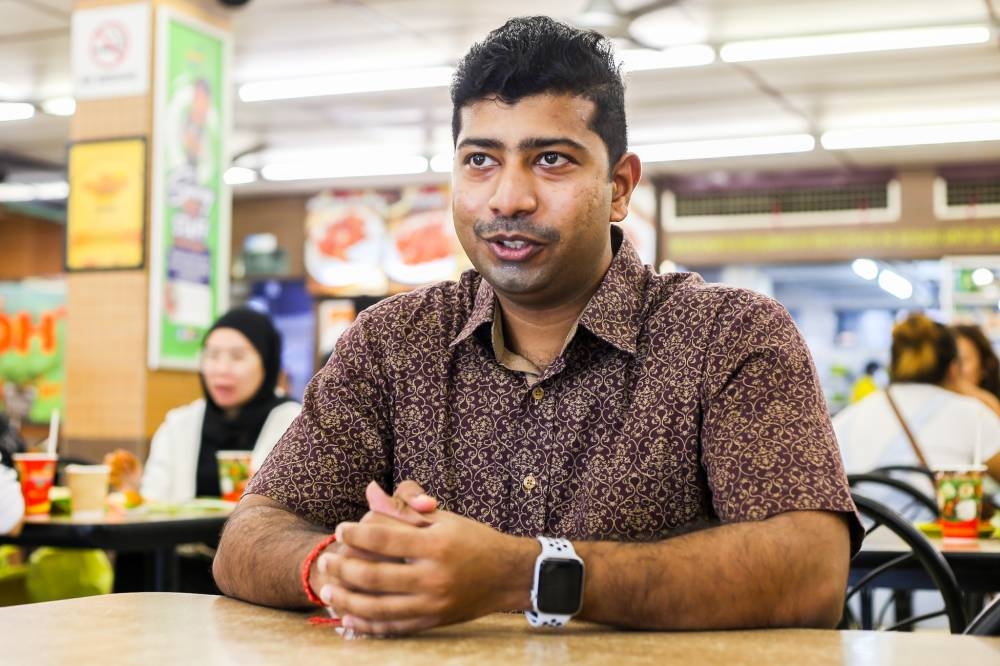
The move comes after all its seven branches could not get local employees to fill the vacancies of the 50 foreign staff who returned to their home country since the onset of the Covid-19 pandemic.
Yoga said a new “introduce your friend” scheme would also be announced soon, offering Malaysian workers a RM200 finder’s fee for each other local recruit they introduced that stayed on for at least a month.
“Very simple example. For the first branch in Section 17, we need at least 40 workers. It’s three shops together. We need 40 workers. Now, we have about 16 workers there. We have the air-conditioned section, non-air-conditioned section and a section under the trees. As for the outdoor sitting, we have closed it owing to the pandemic, and also a lack of staff,” he said.
Yoga said that his management also cut working hours to allow workers to rest, and after seeing how many of their fellow industry players were forced to minimise their operation sizes due to fruitless recruitment efforts.
“We used to operate from 6am to 10pm daily, now it’s 8am to 8pm, because we want the staff to rest as well. As you know, many of my friends in the restaurant industry, some have closed down parts of their operations. We have seven branches and all are running, but we are struggling very badly,” Yoga added.
He also shared Mathana’s sentiment, lamenting the difficulty in hiring Malaysians for his restaurants.
“We are also recruiting many locals to try and survive, but honestly it has not been successful. The iPhone plan, we mainly came up with that because locals who worked with us, just worked for one month or two, and they left. They try to learn something and they branch out wanting to open their own ventures. It’s not suitable for locals who are not willing to stay on.
“It’s not like we do not want to take local staff, but they just don’t turn up on our side,” he added.
Under the gazetted Minimum Wage Order (MWO) 2022, Malaysia officially increased the national minimum wage to RM1,500 for all workers beginning May 1.
Yoga added that he already pays his foreign staff over RM1,500 even before the MWO took effect, as they were already skilled in preparing items like roti canai and teh tarik, and needed no additional training.
He also noted that Kanna was only hiring Malaysians as waiters because it was hard to find locals with the same culinary skills as the workers from India he hired.
Yoga conceded that higher salaries could make the offer more tempting, but claimed it would increase prices.
“For example, roti canai is about RM1 plus, but when we hire locals, it can go up to RM4 because we have to pay them higher,” he claimed.
“Now the basic pay is RM2,080, and this is not including overtime, and they can earn up to RM3,000. The calculation in simple: 26 days of work and other days, should they work, they get paid for OT. For one hour, we pay RM10. So, when they work eight hours per day, they are eligible to work another two hours and if they request, they can work another four hours,” he added.
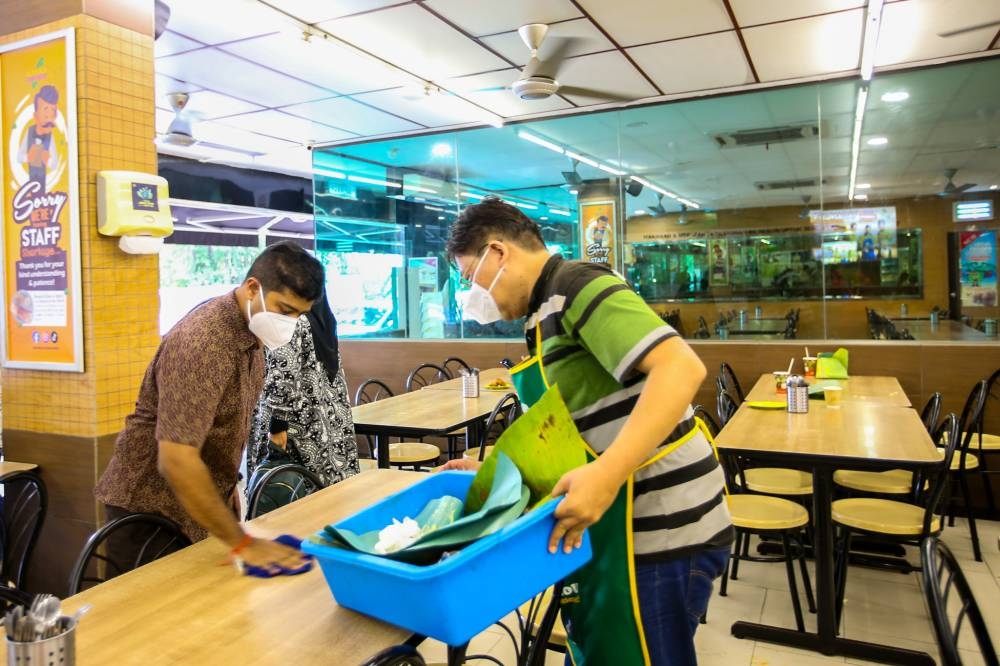
So, how many have claimed the iPhones? Five, Yoga said, with three more in the running. The five who have claimed them are still working with the restaurant, he added.
Yoga also said the management went to great lengths to restructure operating hours to be more appealing to Malaysians, going from 8am till 8pm to 9am till 5pm.
“When it comes to the Malaysian mindset, people always think it is long hours of work, so we tried to put a stop to it.
“We try our best to not trouble them. Washing plates, working in the kitchen is hard work, so we made them frontline staff, waiting tables. This is because we also use recycled plates and cups to reduce manpower for washing. So, we’ve got to work around it and be smart,” he added.

Like Mathana, Yoga also urged the government to speed up approval for foreign labour applications. He said he has applied for workers from India, Punjab and Sri Lanka, and was now scouting in Bihar.
He also urged the government to cap the fees for hiring foreign workers, saying businesses were already grappling with rising costs.
“We have got between 30 and 40 per cent increase in all raw items. We have advertised that beginning July, we will increase prices of food to 10 per cent. If we do not increase, we are going to have it harder. We use quality materials and raw items. We use ‘A’ grade eggs and Ayam Brand sardine.
“Price is one thing, another issue is labour shortage and if things get worse, we may have to close down outlets or cut down hours. Our next plan in the next two to three months, we are planning to change operation hours from 10am to 6pm. Only from lunchtime to tea time,” he added.






















